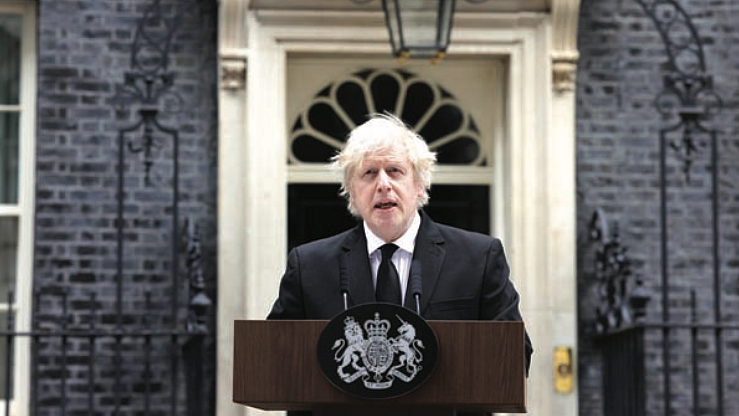London Diary: Party & a 'non-party' party
PM Boris Johnson is dragged into yet another controversy after it emerged that his staff held a party last December flouting his govt's strict instructions to the public against Christmas gatherings

When is a party a party? Will simply wine and cheese do? Or will it need more formal trappings —canapés, kebabs and presents?
So, what was it that happened in Number 10, Downing Street —the seat of British government—in the run-up to Christmas last year when the rest of the country was under a virtual Covid lockdown with a blanket ban on anything that even remotely smacked of a get-together, let alone office parties? Was it a party?
Prime Minister Boris Johnson has been dragged into one of the most damaging controversies of his chaotic tenure after it emerged that his staff held a party last December flouting his government’s strict instructions to the public against Christmas gatherings. The revelation has unleashed a media frenzy and sparked nationwide protests with people accusing his administration of double- standards.
Initially, he tried to brazen it out insisting that “no party” had taken place. And he might have gone away with it, but then video footage surfaced, undermining his denial. It showed his aides joking about how to fend off media inquiries about the party. Faced with pressure to resign, he was forced to apologise and order an inquiry while still keeping up the fiction that he was not aware of any “party”.
Curiously, there has been no official denial that an event did take place, but only that whatever it was it could not be described as a “party”! Really? If a room full of people making merry over wine and a “proper food spread”, as reports suggest, doesn’t add up to a party, what does?
Not surprisingly, nobody believes the official denials according to an opinion poll. Some of the harshest criticism has come from Johnson’s own party colleagues who believe he has lost public trust. It’s seen as the most politically damaging moment of his premiership. He may yet survive it but has left his authority irreparably undermined while the mystery remains as to what his boys were up to that evening if they were not partying.
A refreshing change
I’m so used to receiving emails from right-wing ex-pat organisations peddling the Hindu nationalist agenda that my first instinct on seeing a mail from Hindus for Human Rights (HfHR) was to delete it, but my journalistic curiosity had the better of me—and just well.
For, I was pleasantly surprised to learn that it’s actually a progressive Hindu group that campaigns to defend the human rights of “vulnerable” communities in India. It sees itself as a forum to promote what it calls “inclusive voices from a Hindu perspective”.
“As bigotry in the name of a (fraudulent) Hinduism has become more powerful than ever, it is time for us to speak up,” it says.
In recent months, it has highlighted and sought to mobilise international public opinion around issues like the treatment of Muslims in India, the crackdown in Kashmir and intolerance of free speech. It also spoke up for Indian farmers during their long agitation against the Modi Government’s botched attempt to push through arbitrary agricultural reforms.
Wonder how many in India have heard of HfHR.
Brushed up?
Imagine receiving an expensive new brand of after-shave or a bag of high-end cosmetics you never ordered. Many Brits have reported receiving such mystery parcels and when they tried to return them, they were told these were theirs to keep.
A journalist who received an unsolicited package of a “posh-looking body-care wash” later discovered that she had inadvertently been drawn into a scam. It’s called “brushing” —a trick used by some companies to inflate their sales figures.
“An unscrupulous seller sends products to unsuspecting people then falsely logs it as a genuine sale to inflate turnover and mislead others into buying it,” she wrote.
According to the consumer magazine “Which?” the trend is spreading fast with nearly a million households likely to have ended up with unexpected freebies. Well,
I’m not among them. Not yet.
Racism? What racism?
The English cricket race row, sparked by the Pakistani-origin cricketer Azeem Rafiq’s explosive claims of racism against his Yorkshire County Cricket colleagues, has prompted an interesting discussion on Yorkshire’s in-your-face and politically incorrect attitude. Or what The Times’ columnist Janice Turner calls its “ribald spirit and individualism and bluntness”.

“Its most revered warriors were dour, cussed, stubborn individualists epitomised by ‘King’ Geoffrey Boycott...accumulating runs at his own selfish pace, heedless of his team’s needs. Yorkshire’s credo was: “Hear all, see all, say nowt; Eat all, sup all, pay nowt...”, she wrote.
In other words, boys will be boys. But racists? No.
And, lastly, there’s a joke apparently going round Westminster that the announcement of the birth of Boris Johnson’s newest baby (his seventh officially known child including four from his previous wife and one from an extramarital affair) was intended to divert attention from his current political problems. An old ploy known as the “dead cat” tactic when you fling a dead cat at a mob to distract it.
(This article was first published in National Herald on Sunday)
Follow us on: Facebook, Twitter, Google News, Instagram
Join our official telegram channel (@nationalherald) and stay updated with the latest headlines